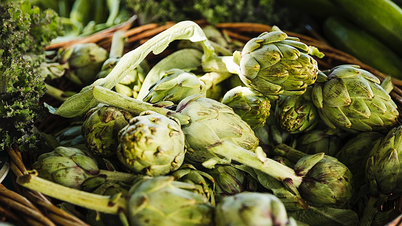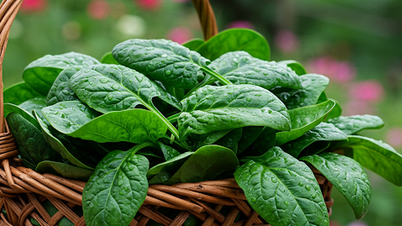Asparagus is a precious vegetable originating from Europe and is known as the "emperor's vegetable". When eaten, asparagus has a fragrant taste, crunchy, sweet, and astringent when bitten. Used in soup or stir-fried, boiled, steamed, grilled... all have the characteristic delicious taste of asparagus.
Nutritionally, asparagus is known as one of the foods that has many health benefits for the body. Asparagus is quite rich in Vitamins A, C, E, K and B - B1, B2, B3 (niacin), B5 and Vitamin B6, as well as choline, a nutrient related to vitamins.
Asparagus also provides flavonoids, fiber, protein, and folic acid (helpful in reaping the benefits of vitamin B12 and in creating new red blood cells). And it's packed with minerals—calcium, iron, zinc, magnesium, copper, selenium, phosphorus, and potassium.

Illustration
9 amazing health benefits of asparagus
Asparagus is good for the heart
Because it is rich in potassium, it helps regulate blood pressure, and because it contains a lot of folate, it helps keep the heart healthy. Asparagus contains a lot of fiber, which can dissolve the annoying cholesterol in the blood.
Asparagus is good for the intestines
Asparagus contains a carbohydrate called inulin, which is important for proper intestinal function. Inulin also promotes the growth of beneficial intestinal bacteria such as Lactobacilli and Bifidobacteria. Because of its high fiber content, asparagus has a laxative effect.
Asparagus helps fight inflammation
Asparagus is known to have anti-inflammatory properties, helping to protect the body against the risk of heart disease and type 2 diabetes. Asparagus has the effect of treating cystitis, preventing kidney stones, gallstones... has antioxidant compounds, purple asparagus contains more antioxidant compounds than other colors...
Asparagus helps prevent aging
Asparagus contains an antioxidant called glutathione, which protects the skin from damage caused by the sun.
Asparagus helps prevent osteoporosis
Asparagus is a rich source of vitamin K, which helps blood clot faster and also helps strengthen bones.
Asparagus helps lose weight
As a low-calorie food, asparagus is very effective in the "fight" against weight loss.

Illustration
Asparagus is good for the fetus
Because it contains a lot of folate, asparagus is very beneficial for pregnant women, because folate is an essential vitamin needed for the formation of the fetal neural tube, preventing birth defects.
In addition, asparagus helps regulate menstruation and relieve pain during menstruation.
Asparagus helps beautify the skin
Asparagus contains a lot of vitamin C and vitamin A. These are two leading antioxidants that protect the skin from the invasion of free radicals. Vitamin C also helps in the synthesis of collagen. Collagen is a protein that supports the skin and prevents skin aging.
Asparagus helps prevent cancer
Cancer and related diseases will be reduced if you eat a lot of asparagus. Glutathione – an antioxidant that can prevent and treat cancer – is abundant in asparagus.
4 groups of people need to be careful when eating asparagus

Illustration
People with allergies
If you eat too much asparagus, you may experience problems such as bloating and unpleasant-smelling urine. Some people who are allergic to celery, leeks, etc. are also at increased risk of being allergic to asparagus. Therefore, after eating asparagus, if you experience symptoms such as: runny nose, rash, difficulty breathing, blisters around the eyes or painful swelling of the mouth, etc., it is best not to eat it.
Edema
If you have edema due to heart or kidney disorders, please do not eat asparagus dishes. Research suggests that this vegetable can be harmful to patients with edema. To avoid complications, it is important to avoid and consult a doctor before consuming foods.
People taking high blood pressure medication
Asparagus is known to play a positive role in regulating blood pressure, thus reducing the risks of high blood pressure. However, if you have high blood pressure and are taking antihypertensive drugs, be careful when eating asparagus because it can react with the drug, causing blood pressure to drop suddenly, which is harmful to the body.
People with gout
People with gout need to follow a reasonable diet to help lower uric acid in the blood by limiting the intake of purines into the body. Asparagus is in the group with the highest purine content (over 150mg/100g of food), so people with gout should avoid it because it can cause joint pain when consumed.
Source







![[Photo] Prime Minister Pham Minh Chinh chairs conference on anti-smuggling, trade fraud, and counterfeit goods](https://vphoto.vietnam.vn/thumb/1200x675/vietnam/resource/IMAGE/2025/5/14/6cd67667e99e4248b7d4f587fd21e37c)































































































Comment (0)